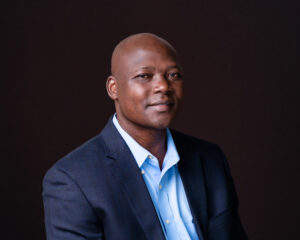This post is part of the MennoCon23 #BeTransformed series. MennoCon23 will be held in Kansas City, Missouri, July 3-6.
 Nelson Okanya is the Global Missions President for the Center for Serving Leadership in Pittsburgh, Pennsylvania. He is also the chair of the Global Mission Fellowship, a support network for Anabaptist-related churches and mission groups, facilitated by Mennonite World Conference. Previously, Nelson served as a pastor and the president of Eastern Mennonite Missions. He holds a Master of Divinity from Eastern Mennonite Seminary and a doctorate in intercultural studies from Fuller Theological Seminary. He attends James Street Mennonite Church in Lancaster, Pennsylvania. Nelson will be speaking at MennoCon23 on Monday evening, July 3.
Nelson Okanya is the Global Missions President for the Center for Serving Leadership in Pittsburgh, Pennsylvania. He is also the chair of the Global Mission Fellowship, a support network for Anabaptist-related churches and mission groups, facilitated by Mennonite World Conference. Previously, Nelson served as a pastor and the president of Eastern Mennonite Missions. He holds a Master of Divinity from Eastern Mennonite Seminary and a doctorate in intercultural studies from Fuller Theological Seminary. He attends James Street Mennonite Church in Lancaster, Pennsylvania. Nelson will be speaking at MennoCon23 on Monday evening, July 3.
______________________________
“[The church is a] community capable of hearing the story of God we find in the scripture and living in a manner that is faithful to that story.”
— Stanley Hauerwas1
During election seasons in America, we get flooded by advertisements. The main purpose of these advertisements is to shape our perspectives about the candidates whom we may choose to vote for in the elections. The advertisements are quite expensive, but candidates buy the airtime or printed spaces in the media to make a direct appeal to voters to vote for the advertisement-buyer, or at least not to vote for their opponents. The advertisements are effective, because they tell a story of the kind of community the advertisement-buyer promises. Such a promises — although not always delivered — are intended to shape the potential voter’s thinking and leads them to determine how to cast their votes. These advertisements are effective, because they tell a story and inspire voters to imagine a desired reality that aligns with their values.
Stories are powerful!
They shape our minds, create imaginations and move us to act in certain ways, as the, albeit imperfect, advertisement story above does in political elections. In a similar manner, a community’s story shapes its people’s lives, and those lives display the truth of its story. For the church, Hauerwas starkly states, “The truthfulness of Jesus creates and is known by the kind of community his story should form.”1 What kind of community are we known to be? How is our location in a pluralistic context in the world displaying the truth of the story of Jesus?
Along these same lines, the apostle Paul writes to the church in Rome:
“Don’t be conformed to the patterns of this world, but be transformed by the renewing of your minds so that you can figure out what God’s will is—what is good and pleasing and mature” (Romans 12:2 CEB).
I believe that our work, as Jesus followers, is the work of learning to live in a manner that is good and pleasing to God. Such a living is only made possible when our minds are renewed and our bodies are fully offered to the one God who has made the ultimate sacrifice for the salvation of all. The renewed mind and newly alive body — the church — belongs to God and is to be offered to God in worship and to the work of the new creation.
The body of Christ and all its members must not conform to the patterns of our society, past and present, that view people from earthly perspectives.
Our location in the world ought to demonstrate God’s forgiveness, reconciliation and the formation of a new social order. To be a Christian is not to conform to the patterns of this world. These patterns will try to draw our attention, make us preoccupied by their deforming and demeaning agendas, and mold us into reactive, diminished people, but believers must not fall for these tricks.
Instead, we must be transformed, as a people, as whole systems, by the renewing of our minds and by fully worshiping our Lord and demonstrating God’s vision of renewal and transformation.
The true God is worthy of worship with our whole selves, body and all. We must learn to think straight, as members of the age to come, which has already begun in Jesus. In thought and practice, we ought to discover what a genuine and God-pleasing human life looks like and work out what God’s will today is. To that end, God has gifted the body with many gifts for service (Romans 12), while we are living in the in-between the ages. Join us for further reflection on this subject in Kansas City, Missouri, at MennoCon23.
1Hauerwas, Stanley. 2013. A Community of Character: Toward a Constructive Christian Social Ethic. Notre Dame, IN: University of Notre Dame Press.
Register for MennoCon23 today!
The views and opinions expressed in this blog belong to the author and are not intended to represent the views of the MC USA Executive Board or staff.
Interested in submitting a blog for Menno Snapshots? Please see our blog guidelines here.


